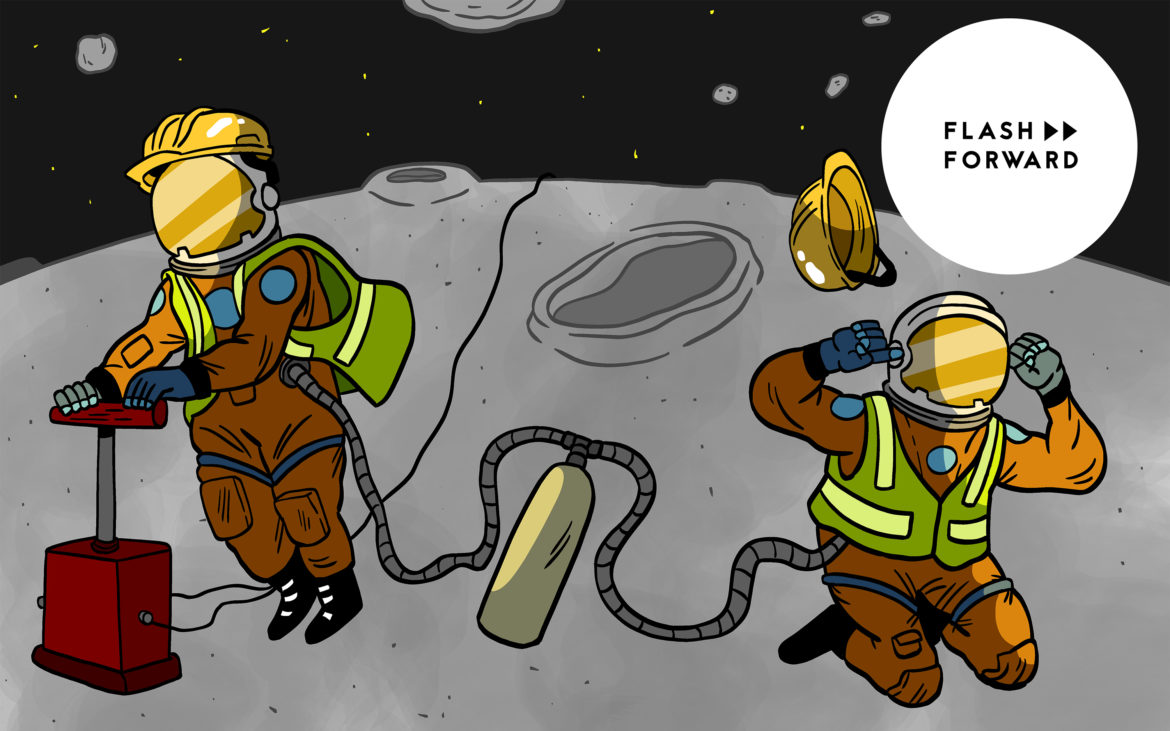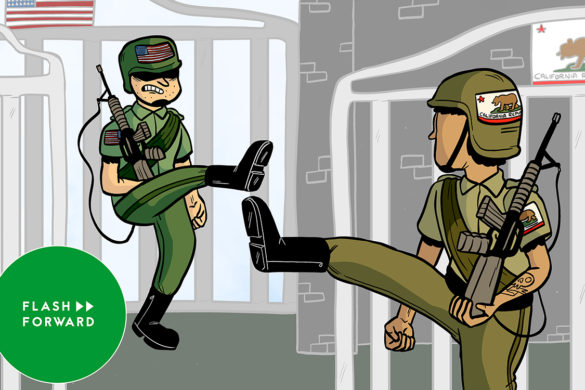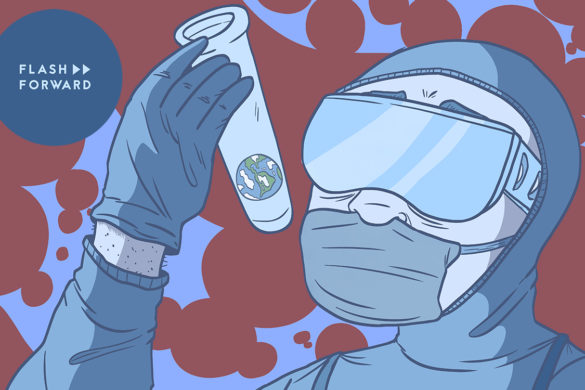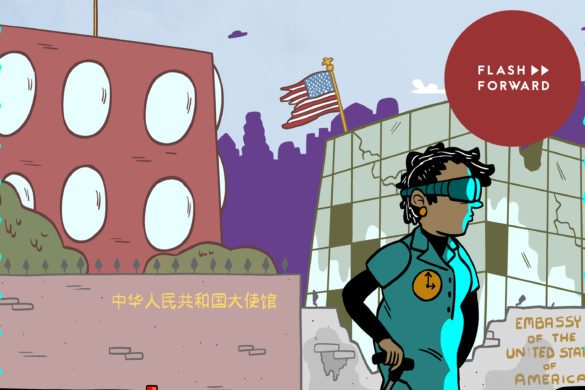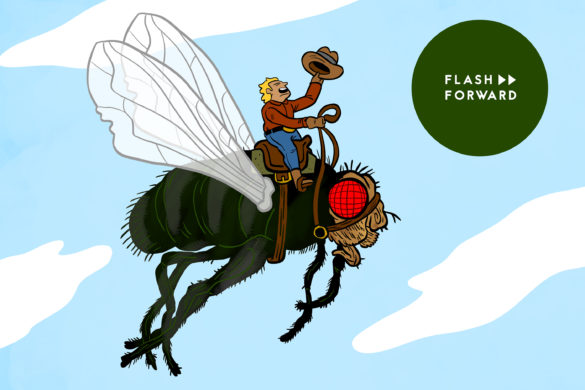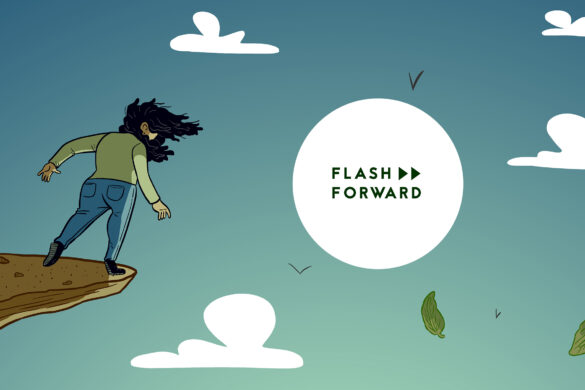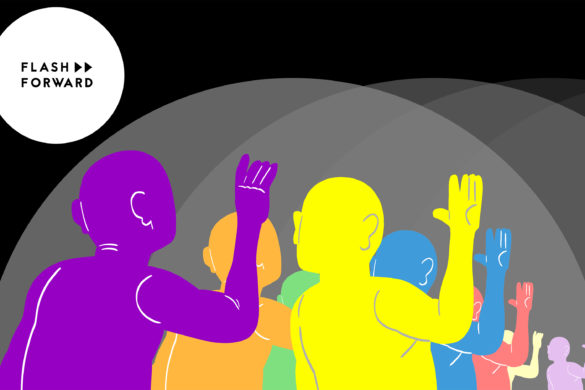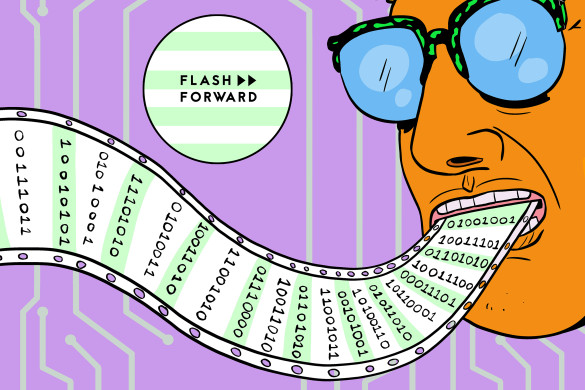Today we travel to a future where humans (try to) mine asteroids for resources.
Guests:
- Atossa Abrahamian, a journalist who’s written about space mining and is working on a new book about “places in the world where the rules don’t (fully) apply.”
- Dr. Andreas Hein, a space systems engineer and executive director of the Initiative for Interstellar Studies.
- Dr. Ram Jakhu, a professor at the McGill Institute of Air and Space Law and editor of Global Space Governance: An International Study.
- Dr. Erika Nesvold, an astrophysicist, co-founder of the JustSpace Alliance, and host of the podcast Making New Worlds.
- Dr. Jim Schwartz, a professor of philosophy at Wichita State University who writes about space ethics.
Voice Actors:
- Receptionist/Robot: Ashley Kellem
- Gabby: Anjali Kunapaneni
- Melissa: Chelsey B. Coombs
- Mark: Henry Alexander Kelly
Further Reading:
- How the asteroid-mining bubble burst
- Goldman Sachs: space-mining for platinum is ‘more realistic than perceived’
- Billionaires Are Dead Serious About Moving Factories to Space
- Asteroid Mining Sounds Hard, Right? You Don’t Know the Half of It
- Laser processing of minerals common on asteroids
- A techno-economic analysis of asteroid mining
- Exploring Potential Environmental Benefits of Asteroid Mining
- After buying Planetary Resources, ConsenSys sets its space ideas free — but will sell off the hardware
- Here’s how we could mine the moon for rocket fuel
- Congress Says Yes to Space Mining, No to Rocket Regulations
- The Outer Space Treaty
- U.S. space-mining law seen leading to possible treaty violations
- How an international treaty signed 50 years ago became the backbone for space law
- Mutiny in Space: Why These Skylab Astronauts Never Flew Again
- Tesla ordered to have Elon Musk delete anti-union tweet
- How Amazon prevents unions by surveilling employee activism
- A Right to Return to Earth? Emigration Policy for the Lunar State
- There Will Be Crime in Space
- Lunar Labor Relations
- The Dispossessed
Episode Sponsors:
- BetterHelp: Affordable, private online counseling. Anytime, anywhere. Flash Forward listeners: get 10% off your first month at betterhelp.com/flashforward
- Shaker & Spoon: A subscription cocktail service that helps you learn how to make hand-crafted cocktails right at home. Get $20 off your first box at shakerandspoon.com/ffwd.
- Tab for a Cause: A browser extension that lets you raise money for charity while doing your thing online. Whenever you open a new tab, you’ll see a beautiful photo and a small ad. Part of that ad money goes toward a charity of your choice! Join team Advice For And From The future by signing up at tabforacause.org/flashforward.
- Tavour: Tavour is THE app for fans of beer, craft brews, and trying new and exciting labels. You sign up in the app and can choose the beers you’re interested in (including two new ones DAILY) adding to your own personalized crate. Use code: flashforward for $10 off after your first order of $25 or more.
- Purple Carrot: Purple Carrot is THE plant-based subscription meal kit that makes it easy to cook irresistible meals to fuel your body. Each week, choose from an expansive and delicious menu of dinners, lunches, breakfasts, and snacks! Get $30 off your first box by going to www.purplecarrot.com and entering code FLASH at checkout today! Purple Carrot, the easiest way to eat more plants!
Flash Forward is hosted by Rose Eveleth and produced by Julia Llinas Goodman. The intro music is by Asura and the outtro music is by Hussalonia. The episode art is by Matt Lubchansky. The voices from the future this episode were provided by
If you want to suggest a future we should take on, send us a note on Twitter, Facebook or by email at info@flashforwardpod.com. We love hearing your ideas! And if you think you’ve spotted one of the little references I’ve hidden in the episode, email us there too. If you’re right, I’ll send you something cool.
And if you want to support the show, there are a few ways you can do that too! Head to www.flashforwardpod.com/support for more about how to give. But if that’s not in the cards for you, you can head to iTunes and leave us a nice review or just tell your friends about us. Those things really do help.
That’s all for this future, come back next time and we’ll travel to a new one.
FULL TRANSCRIPT BELOW
▹▹ ▹▹ ▹▹ ▹▹ ▹▹ ▹▹ ▹▹ ▹▹ ▹▹ ▹▹ ▹▹ ▹▹ ▹▹ ▹▹ ▹▹ ▹▹ ▹▹ ▹▹ ▹▹ ▹▹ ▹▹ ▹▹ ▹▹
FLASH FORWARD
S7E04 – “Can You Mine An Asteroid?”
[Flash Forward intro music – “Whispering Through” by Asura, an electronic, rhythm-heavy piece]
ROSE EVELETH:
Hello and welcome to Flash Forward! I’m Rose and I am your host. Flash Forward is a show about the future. Every episode we take on a specific possible… or sometimes not-so-possible future scenario. We always start with a little field trip into the future to check out what is going on, and then we teleport back to today to talk to experts about how that world that we just heard might really go down. Got it? Great!
This episode we are starting in the year 2078.
FICTION SKETCH BEGINS
[ambient building lobby sounds]
MELISSA:
(steps up to reception desk) Um, hi. I’m looking for Fortuna?
RECEPTIONIST:
(coldly) Can I see your ID, please?
MELISSA:
Oh, sure… (fumbles) Here.
[typing]
[printer sounds]
RECEPTIONIST:
Here you go. Please wear this badge at all times. Seventh floor.
MELISSA:
Thanks! (walks to elevator)
[elevator doors close, music plays]
[elevator doors open]
[walking]
GABBY:
Hey, are you looking for Fortuna?
MELISSA:
Yeah.
GABBY:
Me too…
MELISSA:
Yeah. Would’ve been nice if the front desk had said where on the seventh floor.
GABBY:
Right? Well, I already walked all the way that way and didn’t see it, so… Let’s try this way.
[walking together]
MELISSA:
Oh! I think this is the logo, right?
GABBY:
Oh yeah, good call. They really could make the signage better.
[door opens]
RECEPTIONIST:
(friendly) Hello!
GABBY:
(kinda freaked out) Hi… aren’t you the same person from downstairs? The front desk?
RECEPTIONIST:
(still friendly) I don’t know what you’re talking about.
GABBY:
(to Melissa) I’m not crazy, right? This is the same person?
MELISSA:
I think they’re maybe both robots. They do look very similar.
RECEPTIONIST:
You two are here for the 2pm employee training, correct?
MELISSA:
Yeah.
GABBY:
Yep.
RECEPTIONIST:
Excellent. You’ll find your cohort down the hall and to the right. Have a seat anywhere.
[Melissa and Gabby walk down the hall and find seats]
[music begins]
NARRATOR:
(same voice as the receptionists) Hello and welcome to the Fortuna team. We’re so excited to have you on board.
GABBY:
(whispering) Wait, that’s the same voice as the receptionist.
NARRATOR:
At Fortuna, we are ushering in the future, one mission at a time. For centuries, humans have looked to the sky for inspiration, for joy, for navigation, for spirituality. Now, thanks to Fortuna, we can also look to the sky for resources. No longer are we constrained to the materials of Earth. No longer must we worry about destroying the beautiful landscapes of our planet for minerals.
The sky is no longer the limit.
By joining Fortuna, you are joining a team dedicated to conservation, exploration, innovation, and inspiration. Every day at Fortuna will offer a new challenge, a new experience, and new insights into our universe. Fortuna missions succeed because our teams aren’t just highly qualified problem solvers, but because they understand the importance of their work, and of keeping each other safe. Space is promising and incredible, but it’s also challenging. The employees at Fortuna keep each other safe and happy with every choice they make. Welcome to the family.
In front of you, you’ll find employee packets which outline your benefits and contracts in full. No surprises here, you’ve already seen these in your job offers. You’ll also find a schedule for mandatory safety trainings.
Okay, now let’s take a tour of the facility, shall we?
[everybody gets up and begins walking]
GABBY:
Ugh, I hate when companies tell us we’re a family.
MELISSA:
Why?
GABBY:
We’re not a family… we just work together. No offense. I’m Gabby, by the way.
MELISSA:
Melissa. Nice to meet you. I guess it makes sense that they want us to feel like a family, though. I mean, we are going to be stuck up there together for a while. I’d rather be a family than be enemies.
GABBY:
Well, those aren’t the only two options.
MELISSA:
It means they’re going to support us, and we’ll support each other.
GABBY:
We can do that without being a family.
MELISSA:
I guess… It just seems like there’s no harm in trying to really become close when the job is so dangerous and remote.
GABBY:
Well, I promise not to murder you, family or not.
MELISSA:
(laughs) It’s a deal.
FICTION SKETCH END
ROSE:
Okay, so today we are talking about space mining. Going off to the Moon, or other planets, or asteroids, and extracting their resources. And the promise of asteroid mining sounds great.
ATOSSA ABRAHAMIAN:
Someday we shall all be able to, theoretically, send robots, or rovers, or people to asteroids, or Mars, or the Moon to dig up precious stuff, bring it back to Earth, and enrich ourselves.
My name’s Atossa Abrahamian. I’m a writer and journalist in New York, and I’m working on a book currently about weird jurisdictions.
ROSE:
And really, asteroids are kind of the prime target here.
DR. ANDREAS HEIN:
They can be as small as rocks you might find on the street, but could be as big as several dozens or even hundreds of kilometers in diameter. So, really like mountains flying around and free space.
ROSE:
This is Dr. Andreas Hein, an engineer, and the Executive Director of the Initiative for Interstellar Studies.
A couple of years ago, you couldn’t throw a rock near a science publication without hitting some story about asteroid mining and its potential.
ATOSSA:
At first, there was just this very giddy moment where a lot of tech people, a lot of venture capitalists and, like Goldman Sachs for example, had a note about this saying, “OMG, we can get all this stuff in outer space that’s so valuable and just be rich.” That’s typical, you know, mining mentality. “Let’s dig up some stuff and get wealthy.”
ROSE:
By 2016, a startup called Planetary Resources had raised $50 million to do work on asteroid mining. Competitors then popped up. Amazon’s CEO Jeff Bezos argued that in the future, all manufacturing would happen in space and stuff would be shipped back to Earth. And in that future, when we don’t have to make stuff on the planet anymore, Earth would be mostly residential.
ATOSSA:
We’re just going to offshore it all to outer space. So theoretically, I guess, you would have cars being made in space, or on asteroids, or what have you, and Earth would be a wonderful utopia full of trees and, you know, whatever.
ANDREAS:
Potentially you can mine very precious substances like platinum, which is quite scarce or very expensive to mine on Earth. And one idea is to bring back these substances from space down to Earth.
ROSE:
But the reality of asteroid mining is a lot harder than some of those headlines made it seem. In fact, we really have no idea how this would work in practice. On Earth, mining has a long history and we pretty much know how to dig stuff out of the ground, process it, and refine it.
ANDREAS:
We know quite little about how to do this in space for the simple reason that in space you have very different conditions from the conditions you have on Earth. I mean, you don’t have gravity in space, or at least not on asteroids, or tiny bits of gravity, so essentially you are free-floating. And that’s very troublesome for most processes you use for mining on Earth, because if things float around.
That’s quite difficult from a processing perspective, because then when you have liquids, you essentially have bubbles instead of, like, something flowing on the ground. So that’s quite difficult to deal with. Somehow you have to collect these bubbles. You have to extract the material from these bubbles or most material, etc. And essentially we have very little knowledge about how to do this.
ROSE:
Even the simplest parts of this, like the idea that you probably have to drill into the asteroid, can’t actually be taken for granted.
ANDREAS:
That’s also not that self-evident because some of the asteroids might look like solid rocks. Other asteroids might rather look like dust piles. Now imagine having a drill and you want to drill a hole into that, kind of, dust pile. It doesn’t really work. So you have to come up with something else.
ROSE:
Some people have proposed using lasers, rather than drills, to melt the material. But none of this has really been tested. Then, add on top of all of this the fact that you are probably not sending humans to the surface of the asteroid to do this work. It all has to be robotic.
ANDREAS:
Current tendencies go towards an autonomous station just for the reason that bringing humans to asteroids is very complicated. You immediately need much more mass because you have to sustain the life of the astronauts, which means that essentially you have to bring tens of tons to the asteroids, and that’s much more than you would need if you have an autonomous robotic facility.
ROSE:
And it’s not just the technology that hasn’t been worked out. The economics haven’t been either. Andreas published a paper last year trying to actually figure out if any material that you can get on an asteroid would make economic sense to go mine there and then schlep back to Earth. And what they found is that it’s pretty unlikely that this would be profitable. Even if everything goes as perfectly as possible, it could take decades just to break even.
ANDREAS:
We also estimate the ideal values we would need in order to make a profit out of it. I think the reality of it is much more modest.
ATOSSA:
Goldman Sachs issued a note saying this is going to be a huge business. And I think at some point they are another bank determined that there were just tons, and tons, and tons of platinum in outer space. So again, this sets people’s minds on fire. They’re like, “Oh, we can go get the platinum.” Not thinking that that quantity of platinum, it would make platinum effectively worthless.
ROSE:
Andreas has argued that even if it’s not worth the money, currently, economically, to mine platinum on an asteroid and bring it back to Earth, there might actually be other reasons to try it.
ANDREAS:
If we mined platinum in space and bring it down to Earth, we are essentially saving, like, about a factor of 100 in greenhouse gas emissions. There are two reasons for that. The first is that platinum mining on Earth tends to be extremely energy intense.
ROSE:
Today, mining one ton of platinum generates tens of thousands of tons of greenhouse gases. When you consider that nearly 200 tons of platinum are mined every year, that adds up to a lot of emissions.
And the same is true for other metals. When you consider all of the resources mining takes, the waste it generates, and the cost of transporting metals after they’ve been extracted, the mining industry accounts for almost one-third of the entire world’s greenhouse gas emissions. Andreas has estimated that mining one ton of platinum in space could produce less than 200 tons of greenhouse gas, which is a lot less compared to tens of thousands of tons.
Now, I want to be really clear that Andreas’s estimates are just that. They’re estimates. Remember, we don’t really know how to do this, to mine platinum in space. It’s hard to make a really airtight case that this will be better since there are still so many unknowns. But he says that the calculations suggest that it’s worth at least keeping an open mind and not discounting platinum mining in space just yet.
And despite all of the very huge questions that are still unanswered around this,Andreas does believe that someday we will mine stuff on asteroids. But it won’t be any time soon.
ANDREAS:
I think we are still at least decades away from asteroid mining. I mean, if we do a very simple calculation, usually it takes, like, between 5 to 10 years to develop a new space system. So, this is just the spacecraft alone. But if you want to mature a new technology, such as the process or all the technologies involved for mining the asteroid itself, I mean, that might take, like, I don’t know, 10, 20 years, 30 years. And that’s only like the basic prototype. It might be just a prototype technology.
Then you have to scale up and industrialize the process, which means that, again, you have to add something like 10 years or something like that. So you end up with a time horizon, which is like somewhere between 30 and 50 years, just from a development perspective. We’re not talking about the economic perspective here, which means that at some point you need to find investors that are interested in that.
ROSE:
And this is why all of that money and hype that I mentioned earlier has sort of disappeared. Investors today don’t want to wait 50 years to break even.
ATOSSA:
So, there were a number of startups in this space, no pun intended. One of them was called Planetary Resources. And Planetary Resources got a bunch of money from, you know, the usual suspects. They ended up going out of business.
Planetary Resources auctioned off a lot of its stuff. It had actually some vintage pinball machines in the office that I visited in Washington State. I think they auction those off. They had some rovers and things like that that they sold off and they got bought by a blockchain company called ConsenSys. It’s unclear what ConsenSys does or is. Unclear why they would use asteroid mining technology. But that’s crypto for you.
And so that was kind of emblematic of this bubble bursting, you know. All of this bubbly money was going into Planetary Resources. They were getting loads of attention and then, oops, crypto happened to them.
ROSE:
But there is another way of thinking about asteroid mining, one that does not involve shipping platinum back down to Earth.
ATOSSA:
Now I think we’re at a time when the biggest draw of asteroid mining isn’t so much, “We’re going to get rich or we’re going to send people here to do stuff.” It’s, “We’re going to use these places as fueling stations for missions that are going further into the universe.” Having a little gas station as a midway point to Mars, for example.
ANDREAS:
So just imagine gas stations in space so you can fill up your rockets. It could also be interesting for sustaining human life in space because we need water, we need food, and both of these things can be mined from asteroids. Water can be mined directly.
ATOSSA:
Which seems reasonable; seems good. I don’t know when they’re going to pull it off, but it’s definitely more realistic than any of the previous versions of this discussion.
ROSE:
Today, pretty much everybody who works in asteroid mining thinks that this is really the application we’re going to wind up seeing. And that’s in part because the one material that scientists feel decently confident that they can extract and capture from asteroids, is water. It would make no sense to bring water from space to Earth, but in space, water is a really valuable commodity.
ANDREAS:
There’s a clear business case for using water in space because water is a very versatile substance. You could use it as a rocket fuel. You could decompose it for hydrogen and oxygen, which is one of the most powerful rocket fuels out there. You could also use it for astronauts, for sustaining astronauts in space and their life support system. You could also use it as a radiation protection, for instance. So there are many different kinds of applications for water in space.
ROSE:
For Atossa, the interesting thing here isn’t the technology as much as it is the legal and economic implications.
ATOSSA:
If you establish that these are things that can be bought, can be sold, can be traded, then the possibilities for, you know, space capitalism and the groundwork has been laid for space capitalism, for generations to come.
ROSE:
But what are the rules around buying, and selling, and owning stuff in space? Maybe you have some recollection of the idea that that’s kind of not allowed for some reason. The answer is that it sort of depends on who you ask. And we will talk about all of that when we come back.
ADVERTISEMENT: BETTERHELP
This episode is supported in part by BetterHelp.
How are you doing? If the answer is, “Kind of… not great,” or even if you’re fine but you kind of wish you had someone to talk to, you are not alone. There are nine million reasons why you might want to talk to a therapist, and BetterHelp can help you connect with one.
When you sign up, they will assess your needs and match you with your own licensed professional, who you can start communicating with in under 48 hours. And trust me, this is way easier and more effective than some of the things people used to do to treat their problems.
Did you know that Erasmus Darwin, grandfather of Charles Darwin, invented something he called ‘Rotational Therapy’ in the early 19th century? And rotational therapy is pretty much what it sounds like: using centrifugal force to treat mental illness. So patients would sit in a chair that was suspended from the ceiling with ropes and they would get spun around. And the idea was that spinning would reduce brain congestion and thus, obviously, cure mental illness.
It will not shock you to learn that this does not work, but the interesting thing about this is that today there is actually a form of this contraption, the rotational chair, that actually does do something and is used. Modern rotary chair testing is used to help doctors figure out whether the vestibular system, the inner ear, or the neurological system is the cause of a balance disorder.
Today, you do not have to spin – literally or metaphorically – because you can log into your BetterHelp account anytime, and send messages to your counselor, and they will respond with timely and thoughtful answers. Plus, you can schedule weekly video or phone sessions. No spinning chairs required.
BetterHelp is also committed to facilitating great therapeutic matches, so they make it easy and free to change counselors if you need to. In other words, BetterHelp wants you to start living a happier life today.
Visit BetterHelp.com/FlashForward and join the over one million people who have taken charge of their mental health with the help of an experienced professional. In fact, so many people have been using BetterHelp that they are recruiting additional counselors in all 50 states. And there is a special offer to Flash Forward listeners. Get 10% off their first month at BetterHelp.com/FlashForward.
ADVERTISEMENT END
ADVERTISEMENT: PURPLE CARROT
Did you know that loofahs, like the thing that you might use in the bath to scrub yourself, are made from squash? In fact, they come from the loofah genus of tropical and subtropical vines, which are in the cucumber family!
Okay, I need you to promise me something. After you are done listening to this episode, please go look up a video of how loofahs are made. It will blow your mind. It absolutely blew my mind. And that fun fact comes from a Patron, so thank you, Doug. And it is a great way to kick off this little advertisement, which is about vegetables and how to eat them.
Purple Carrot is the plant-based subscription meal kit that makes it easy to cook irresistible meals to fuel your body. Each week, choose from an expansive and delicious menu of dinners, lunches, breakfasts, and snacks. Very important, the snacks.
You can sign up for a plan, like High Protein, or Gluten Free, or Quick and Easy, or customize your order every week. You can skip or cancel your box anytime. Every Purple Carrot box is an opportunity to learn and experience something new with easy recipes and fresh, pre-portioned ingredients. No shopping, no food waste; just restaurant quality, plant-based meals.
Get $30 off your first box by going to PurpleCarrot.com and entering the code FLASH at checkout today. Purple Carrot: The easiest way to eat more plants.
ADVERTISEMENT END
FICTION SKETCH BEGINS
[airlock opens and closes]
GABBY:
Hey, whoa… Are you okay?
MELISSA:
Not really. Mark has been sick so I’ve been picking up all his shifts. I haven’t slept in three days.
GABBY:
Dude, that is not okay. You don’t have to do his work.
MELISSA:
Well, he asked me to, and he doesn’t really want management to know he’s sick again.
GABBY:
I get that but, like, you have to sleep.
MELISSA:
He’s gonna get fired if they find out.
GABBY:
I think it’s illegal to fire someone for health issues.
MELISSA:
Well, they don’t seem to think that. They basically told him they would.
GABBY:
It’s definitely illegal on Earth.
MELISSA:
(snappy) Well, we’re not on Earth, Gabby.
(takes a deep breath) I’m sorry. I’m just tired.
GABBY:
It’s okay. I’d be snappy if I were you too. But seriously, this isn’t sustainable. You have to take care of yourself. This Fortuna isn’t going to look out for you. You know that, right?
MELISSA:
So much for “Welcome to the family.”
GABBY:
I mean… I hate to say I told you so?
MELISSA:
Yeah… thanks. I’m going to go take a nap.
[airlock opens and closes]
GABBY:
Hey, Computer.
[Wake chime]
COMPUTER:
(same voice as receptionist and narrator) Hello, Gabby.
GABBY:
What are our options for contacting Earth?
COMPUTER:
Why do you want to contact Earth?
GABBY:
(irritated) What. Are. Our. Options. For contacting Earth?
COMPUTER:
There are two ways to contact Earth. You can send a physical letter to be packaged with the next shipment. Or you can use Fortuna’s communication line down to Earth.
GABBY:
And the Fortuna communication line is not private, correct?
COMPUTER:
Fortuna communications are monitored for your safety.
GABBY:
Right… for my safety. Are physical letters monitored?
COMPUTER:
Physical letters may be monitored as well.
GABBY:
Maybe?
COMPUTER:
Not all physical mail is monitored. Fortuna adheres to the laws of the postal service where your letter is addressed to.
GABBY:
Interesting…
COMPUTER:
Can I help you with anything else?
GABBY:
No.
[closing chime]
FICTION SKETCH END
ROSE:
Okay, so what are the laws in space? Can you, in fact, own an asteroid? Can you mine an asteroid? Are you even allowed to do this? This is actually what got Atossa interested in this whole asteroid-mining thing to begin with.
ATOSSA:
So my introduction to asteroid mining wasn’t through Star Wars. It was through the op-ed page of The Wall Street Journal. I remember very clearly the minute I realized this was a thing. I was sitting at my desk in the West Village when I was working at Al Jazeera and I was dicking around online, like you do. (laughs)
And I ended up on this op-ed that was very, very gung ho about a new law that had passed in the United States called… the abbreviated version is the Space Act. And it was very interesting because it essentially made it possible for Americans to own property in outer space. And I thought that was just so weird, and cool, and bizarre, and kind of messed up.
ROSE:
The US law she’s talking about, its full title is the Spurring Private Aerospace Competitiveness and Entrepreneurship (SPACE) Act of 2015. The point of it is to, as its name implies, spur private aerospace competitiveness. Basically, in order for private companies to want to invest in the technologies that might lead to space mining, they need to feel like they are actually going to be able to own the stuff they mine and profit from it.
ATOSSA:
Well, first of all, it really makes you think about property rights, and what are they, and who decides them. And then you add the element of intrigue, which is outer space. The combination of absurdity, and legalism, and novelty really drew me. So that, I think, led me down some reading rabbit holes.
And I soon learned that Luxembourg, the country, was also passing a law very similar to the US one, wherein anyone with a Luxembourg-registered company could also own property in outer space. What kind of property can you own in outer space? That’s where asteroid mining comes in.
ROSE:
Now, you might be thinking: Wait a minute. You can’t own property in outer space, right? If you have heard our past episodes about space and law, you may remember vaguely that there is some kind of treaty about this.
DR. RAM JAKHU:
So what this treaty says, the key point is so important, if it is ignored, if it is taken away, the whole building will fall. And that is Article I Paragraph 1 of the Outer Space treaty. Which says exploration, use of outer space and celestial bodies, shall be carried out in the interest of the benefit of all countries.
ROSE:
This is Dr. Ram Jakhu, a professor of law at the McGill Institute of Air and Space Law. So the Outer Space treaty he’s referring to was ratified in 1967 by the United States, United Kingdom, and the Soviet Union. Today, there are 110 countries that are party to this treaty. Ram actually had a copy handy on his desk, to read to me from.
RAM:
I’ll lay my hand on the treaty here. I don’t want to be misquoting. But anyway, when you look for something, you can find it.
ROSE:
Article I Paragraph 1 reads as follows:
The exploration and use of outer space, including the moon and other celestial bodies, shall be carried out for the benefit and in the interests of all countries, irrespective of their degree of economic or scientific development, and shall be the province of all mankind.
Article I, Paragraph 2 says this:
Outer space, including the moon and other celestial bodies, shall be free for exploration and use by all States without discrimination of any kind, on a basis of equality and in accordance with international law, and there shall be free access to all areas of celestial bodies.
So, space is free to explore by everybody, and any exploration should be carried out for the benefit and interest of all countries. And this is really the main part that matters, Ram says.
When you start reading up about debates around the legality of space mining, it’s actually not the two paragraphs that I just read that people like to talk about. It’s actually Article II that comes up the most. Which reads:
Outer space, including the moon and other celestial bodies, is not subject to national appropriation by claim of sovereignty, by means of use or occupation, or by any other means.
There are lots of people who argue that, well, that article says that nations can’t claim stuff in space, but it doesn’t say anything about private companies. And it doesn’t say that you can’t extract stuff without claiming sovereignty.
But Ram says that this is all kind of a red herring.
RAM:
That argument is advocacy. They advocate the point. And that means it doesn’t have to be logical. Maybe they do not read or they do not want to read the whole entire treaty.
ROSE:
Because all this technicality stuff doesn’t matter if you remember to read Article I Paragraph 1, which again, says that all of this has to be carried out for the benefit and in the interests of all countries, not just private profit.
RAM:
If that is not there, everything, to me, is useless. That means you can do whatever you want. So that is what… The people do not look at that, or they ignore it intentionally, and they said, “Well, okay, that’s okay. This is a wishy-washy thing. This is the goal and this is our goal.” No, it’s not. It was there, put in the operating part of the treaty intentionally. And the final text of the treaty was adopted only when this was adopted in the operating part. So if you ignore that part, that means anybody can do whatever he, or she, or they, want to do.
ROSE:
You can’t pick and choose which sections of the Outer Space Treaty are the ones that you care about, and which ones you want to ignore. So sure, you can nitpick about sovereignty and nationhood in Article II until the cows come home, but if you’re ignoring Article I, then it sort of doesn’t matter. And again, Article I says that this has to benefit everybody.
RAM:
So the governments, or private companies, or individuals are saying, “Oh, you know, I’m free. I look at Article I Para 2, which says I have freedom,” and that’s it. And that is not even taking the full sentence. It says they “shall be free for exploration and use,” and they stop there. They do not complete the next part of that.
It says, “the moon and other celestial bodies, shall be free for exploration and use by all States.” I would say almost 90%, 95% will stop there. Their freedom. But there’s not even a comma after that. It says, “free for exploration and use by all States.” And the sentence continues, “without discrimination of any kind, on a basis of equality and in accordance with international law.” So it’s a pick and choose.
ROSE:
Think of it this way, Ram says: Let’s say that you and I agree that I’m going to sell you my car for $5,000, which would not be a good deal for you because I drive a 2007 Toyota Sienna minivan.
RAM:
And later on, I will say, “Well you know, Rose, you told me that you will give me your car. And that’s what is written.” But if you say, “Well, the next clause says that you will pay $5,000,” I will say, “Forget about that. I’m worried about this one.”
ROSE:
You don’t get to pick and choose which clauses in a contract you want to abide by and which ones you would just like to ignore.
RAM:
So the contract between you about buying your car, I will say, “Rose will deliver this car to me,” that’s it. It says, “subject to me paying $5,000,” Well, forget about that. This is what it is. I think this is what is happening.
The treaty never prohibits the development of space. Actually, the treaty was designed to facilitate the development of space. For this purpose, that is for everybody. That means there has to be balance in all those interests. So you’re allowed to explore and use so long as you do not appropriate yourself exclusively and say, “Close down the door for everybody.”
ROSE:
And when you have private companies whose goal is to make money for their shareholders, well, then, it’s not for everybody. Sort of by definition.
So what about this 2015 US law? The one that said that private companies could indeed do what it seems like the Outer Space Treaty pretty clearly says they cannot do?
RAM:
It said the US will allow private companies to appropriate these things subject to their international obligations.
ROSE:
In other words, whatever US companies do under this new law will still, in theory at least, have to abide by the Outer Space Treaty. What that actually looks like in practice is very unclear.
The law is sort of fundamentally reactive. It tends to wait until there is something that happens and that needs to be ruled on. You often have to bring a case in order to change the legal system. If something hasn’t happened yet, like, say, asteroid mining, you can’t easily challenge the laws that exist around that thing.
And that doesn’t just apply to whether or not it’s baseline legal to get rich off of platinum in asteroids for your personal gain. It also applies to nearly every aspect of life and work in space.
DR. JAMES SCHWARTZ:
Space is not any kind of magic button for anyone for any reason. We don’t succeed at doing things in space unless we actually make decisions that lead to those things happening.
ROSE:
And when we come back, we’re going to talk about the ethical and philosophical questions that asteroid mining raises. But first, a quick break.
ADVERTISEMENT: KNOWABLE
What do NBA All-Star Chris Paul, NASA commander Scott Kelly, and super smart podcaster Kristen Meinzer have in common? They all have incredible experiences, and they have taken those experiences and crafted audio courses to teach you what they have learned. Those audio courses are on Knowable, which is a new app where the world’s top experts teach new skills in bite-sized audio courses.
It’s sort of like someone took a podcast, added audiobook, and put them in, like, a pressure cooker, and then stood back and released that pressure with a totally normal and not-terrified facial expression, and what they got were little snippets of pure, distilled learning.
NASA commander Scott Kelly teaches lessons learned from a career in space. NBA All-Star Chris Paul discusses the performance benefits of his plant-based lifestyle. And podcaster Kristen Meinzer tells you everything she has learned about how to be happier from years of research.
Knowable is accessible on your phone and on the web, and each audio course is broken out into individual lessons, usually about 15 minutes long. You can explore at your own pace, and each class is supported by downloadable materials, lessons, recipes, and more. I know that you like learning, okay? You don’t have to lie to me. We are friends, sort of. And this is a place where learning is cool and good, and you can do it on Knowable.
So are you ready to learn something new today? You can download the Knowable app or visit Knowable.fyi and use the code FLASHFORWARD for an additional 20% off.
ADVERTISEMENT END
ADVERTISEMENT: TAB FOR A CAUSE
All right, so let’s imagine for a moment that you are an astronaut and you want to get on the internet, obviously, so you can watch TikToks or whatever it is. And you can do that, it just takes a while. Astronauts on the ISS have to use a remote desktop tool on computers on the ground that have access to the internet. So every click has to go from the ISS to a geosynchronous satellite, back down to the ground. Then the actual click on the machine, they have to wait for the web, and then back up to the geosynchronous satellite, and then back over to the ISS. What that means is that even just moving a mouse around is slow because there are all these steps.
That fun fact comes from Patron William Andrews. But thankfully, you probably do not have to wait that long to browse the internet. It probably takes you, like, a second or less to open up a new tab and search for something. And if you use Tab for a Cause every time you open up a new tab, you can raise money for charity. With the Tab for a Cause extension, whenever you open up a new tab you will see a beautiful photo and a very small ad. Part of that ad money goes towards a charity of your choice. And you can join team Flash Forward by signing up at TabforaCause.org/FlashForward.
ADVERTISEMENT END
FICTION SKETCH BEGINS
[airlock opens and closes]
GABBY:
Okay, thanks for making time everybody. I know they have us on really intense schedules. And that’s actually kind of what I want to talk about. I wrote to a friend, asking for some advice. He’s a union organizer at Amazon and he sent me some resources.
MELISSA:
Wait… is this a union meeting?
GABBY:
No, because technically we don’t have a union. Yet.
MELISSA:
Can six people even be a union?
GABBY:
Well, we’re not the only six people who work at Fortuna. They’re just on other ships.
MARK:
Have we tried to contact them?
GABBY:
No, because there’s no way to do that without Fortuna knowing and reading our messages. I thought maybe we should get on the same page first.
MARK:
This is not going to work.
GABBY:
Thanks for your input, Mark. Do you have any specific questions or do you just not even want to bother trying to make our jobs and lives better?
MELISSA:
Gabby, I mean, in theory this is a good idea, but… there are six of us. We’re hundreds of thousands of miles from Earth. I don’t even know if unions are legal here.
GABBY:
Nobody knows if unions are legal here, that’s the point. Nobody’s ever tried. But we could, and we could set precedent. If we can make this work we can make this job better for everybody who ever goes up here.
MARK:
A lot of “ifs” in that Gabby.
GABBY:
Mark, you were terrified that you’d be fired if they knew you were sick. If we had a union, that wouldn’t happen. Melissa, you picked up four shifts and missed your sister’s birthday call to help him out. John, you identified a huge safety hazard that they could easily fix and they just won’t. All of this would be protected and addressed by a union. We have six more months up here. Do you want to just suffer through it?
MELISSA:
What does this entail? How do you even start a union?
GABBY:
Okay, so we have a couple of options, I think. We don’t need to start our own union. We could actually become affiliated with a union on Earth. The United Mine Workers of America represents coal miners.
MARK:
You want us to work with coal miners? The whole point of this job is to make coal mining obsolete.
MELISSA:
We’re skilled workers, Gabby, not dirty big men with axes.
GABBY:
Wow, you all truly have no concept of solidarity do you? The jobs aren’t the same, but you know what is the same? Coal miners do dangerous work in isolated conditions and make very little money while their bosses get rich. Sound familiar?
MELISSA:
So what happens if we join them?
GABBY:
They’d be able to help us actually put together a plan and a contract. Look, I’ve never organized a union before. I have these resources but why reinvent the wheel when there’s a big organization that could help us? Plus, they have lawyers on Earth.
MARK:
So we join them, and then what?
GABBY:
Well, I think then we have to get the other engineers on board. Then, we get Fortuna to recognize the union.
MARK:
Ugh. This is never going to work.
GABBY:
Maybe not, but worth a shot I think.
FICTION SKETCH ENDS
ROSE:
Okay, so we have talked about the weird legal stuff that will likely have to be worked out for asteroid mining to be a real thing. We’ve talked about whether or not it even makes sense economically, and we have talked about all of the pretty basic scientific and engineering questions that exist and that are nowhere near being answered. And yet, despite all of that, asteroid mining still has a huge allure, at least to certain people.
DR. ERIKA NESVOLD:
I have a more visual reaction, I think, when you mention space mining, which is just suddenly the image of a cartoon character with dollar signs for eyes, which is the attitude that I get the sense of a lot when I talk to people who are really advocating for asteroid mining as an industry; just this gold rush mentality of, “Oh, there’s a lot of money to be made out there.” And those dollar signs are not for everyone. They’re for the people who can get there first.
ROSE:
This is Dr. Erika Nesvold, an astronomer who works on all things space ethics, who is also the co-founder of the JustSpace Alliance. You have heard her on past episodes about space, and the reason that I called her this time is because she actually did a whole episode of her podcast, which is called Making New Worlds, all about labor rights in space.
ERIKA:
And in that episode, I talked to an activist with the International Labor Rights Forum, Sarah Newell. And I still remember when I first talked to her after we had set up the interview, she said, “I’ve never considered the issues of labor rights in space until your email and now it’s keeping me up at night,” because the people like the International Labor Rights Forum are already dealing with the enormous labor rights mistreatments that people get away with here on Earth in remote locations like the ocean.
And so the idea that you could make all of these cases even worse in a much more remote, unsupervised, isolated environment and a deadlier environment like space is kind of terrifying to someone who works in that field.
DR. JIM SCHWARTZ:
Yeah, and I think I’d agree that, to me, there hasn’t been a lot of consideration given to this, aside from what’s already done, you know, with astronaut training and evaluation. And, you know, there were issues in the past with, say, Skylab astronauts and how their time was budgeted. And there was a little bit of a rebellion that NASA doesn’t like to talk about all that much.
ROSE:
This Dr. Jim Schwartz, and he joined me and Erika to talk about all of this stuff. Jim is a Professor of Philosophy at Wichita State University and he also writes about space ethics. And that NASA rebellion he’s talking about happened in 1973, when three astronauts stopped working for a whole day and cut off contact with NASA while they were orbiting the Earth in a space station called Skylab.
The three astronauts in question were the last crew to head up to Skylab and NASA wanted to squeeze every possible drop of science out of this space station before it was decommissioned. Which meant that the crew had basically zero time to rest or take breaks. About a month into the mission, the crew had had enough and they did this thing where they cut off contact. And after this radio silence, they negotiated with mission control and came up with a less grueling schedule. Now, whether the break in contact was intentional, whether it really counts as a strike, is up for debate. I’m going to talk a little bit more about this story on the bonus podcast this week. But we do know that the astronauts were very unhappy.
ERIKA:
There was a lot of tension about how they were spending their day, and NASA, while they didn’t allow… none of those astronauts flew again, it was the end of that program anyway, NASA did sit down and say, “Maybe we should be considering the psychological health and stamina of our astronauts,” and they adjusted their schedules after that.
ROSE:
While we are probably not going to have humans taking, like, a pick to asteroids, most of the plans for asteroid mining do require some kind of human oversight. Since the lag time between Earth and a far-away asteroid is long, we might wind up putting folks out on support ships closer to the asteroids themselves to help monitor things. If those people, like the people you heard in the fictional pieces of this episode, are employed by a private company, what rights and protections do they have?
ERIKA:
Another great place where we can get our cautionary tales from is Earth today and the history of labor rights on Earth. As I mentioned, issues with people being trafficked, having their passports taken away, and trapped in places where they don’t have any oversight for their labor rights is already a problem on Earth, often in places like the fishing industry.
ROSE:
Now, sometimes when you read about this, you encounter this idea that the people who go to space, asteroid mining or otherwise, will inherently work together, inherently support one another because they’re in a life-or-death situation, because they have to to survive. There’s this idea that they will be better colleagues and collaborators because if they don’t, they will quite literally die. This might be true, but it’s also not exactly a good workplace culture strategy.
JIM:
We’ve got plenty of data that suggests that there are conditions that are both good and bad for people in extreme conditions, that either can contribute to a sense of community and wanting to work with one another, or that could pull people apart in extreme environments. We can’t just take as a premise that if you present people with the threat of death, they’re going to be productive.
Constantly enduring the threat of imminent death is not going to provide a foundation for a viable life. It’s not even going to necessarily get you in community with other people to help survive. Maybe for some people, but it is not a good way to start a society. And what does that set in place as a precedent for how that society develops into the future? I consider it monstrous if we even try without thinking deeply about this.
ROSE:
And even if we have legal structures to protect workers, there is still a huge question of enforcement.
ERIKA:
A legal structure protecting laborers’ and workers’ rights doesn’t do you much good if it’s never enforced. But enforcement comes in two parts. First, you have to be able to observe the crime. And this is going to be where a lot of the problems start out in space. If you don’t have a reporting system, if the workers aren’t able to communicate freely back to Earth… Maybe you need people, the actual observers, third-party objective observers to go out and inspect facilities.
ROSE:
And it’s worth remembering here specifically who on Earth right now is talking most vocally about space mining.
ERIKA:
People like Elon Musk and Jeff Bezos are already running into questions about their workplace conditions in their factories, not just in the space companies like SpaceX and Blue Origin, but also in related places like Tesla and Amazon. And both of them have been criticized for trying to shut down union organizing. And so, we should look at how the people who want to take workers into space are already treating their workers on Earth and address that, which is something we can do now before we even need to worry about our hypothetical space miners.
ROSE:
So, can you unionize in space? The answer is: Maybe? But also, maybe not, because your employer will control not just your workspace, but also your lifelines. Your air supply. Your meals. Your connections back to Earth. And if your employer is – just to pick a random example – Amazon, well, they are probably not going to want you to unionize. And in fact, there are other questions too about what happens if you, say, want to come back down from space.
Jim wrote a paper last year about the question of emigration.
JIM:
What I’m fundamentally asking there is: Are the rules different when you’re creating a new society versus when you’re looking at an already existing one and asking, you know, “When is it okay to intervene in the affairs of this other nation or state?”
There could be really unstable access to resources, surveillance might be necessary, in all kinds of invasive ways to preserve the security of those settlements, to make sure people aren’t destroying life support machinery out of vandalism or opening up airlocks by mistake, kind of thing. There’s just a lot of reasons why you might need to apply some authoritarian kind of strategies to keep folks in line in space. And imagine living in that world.
And you know, imagine being a kid of parents who work jobs they despise that cannot leave those jobs because the government says, “If you don’t do this work, everyone doesn’t get to breathe anymore.” Just imagine how trapped you would feel in that situation. And of course, remember, that’s the way that millions of people on Earth feel because of bad situations too.
ROSE:
Once you start really talking about things like work in space, you start getting into some big philosophical questions. What do we want to replicate from Earth, and what do we want to leave behind, both literally and figuratively?
And there’s actually another set of questions that asteroid mining brings up that I am super fascinated by. And that is: What counts as nature? Remember how Andreas talked about how for some materials, mining in space might be better for the environment on Earth? That raises some interesting questions about where we value nature, and where we don’t.
Lots of people care about polluting the Earth, but what about polluting in space? And Andreas actually does worry about this. Here is what he said when I asked him if anything kept him up at night when it comes to asteroid mining.
ANDREAS:
One thing I’m a little bit worried about is actually the environmental impact in space of asteroid mining, which means that depending on the method you use, you’re probably generating a lot of debris during the mining process.
If you drill into an asteroid or if you apply some mechanical force to the asteroid, you might spill off material; there might be dust generated, and just imagine the kind of huge dust clouds which surround the asteroids. And the dust cloud will slowly move away and generate a, kind of, space debris environment.
And I think today we haven’t really looked into that aspect that much, which means that, once we do these things on an industrial scale, what happens? Maybe generating certain orbits which are no longer accessible because there’s too much dust generated and it gets hazardous to get into these regions. So I mean, it doesn’t keep me up at night, but maybe people, like, I don’t know, in 20 or 30 years, if this is considered seriously, then it might keep future engineers and policymakers up at night.
ERIKA:
People seem to worry less about environmentalism when we’re talking about asteroid mining than when we’re talking about the Moon or Mars. I think they treat it, because it’s less visible from Earth, no one’s going to be living on the asteroid, like literally just junk in space.
If people treat the asteroid belt and its resources as infinite, we are sure to come up against the finite limits of that infinity one of these days because that’s what humans do. We grow exponentially and we hit the limits of our resources.
ROSE:
And this kind of gets back to that point that Atossa was making earlier – which is that most of the visions of asteroid mining today rely on a really specific set of assumptions about what makes money, what the future of space is going to look like, and who is going to profit. But space also offers us the opportunity to question whether those assumptions are the ones we want to stick with.
ERIKA:
The solution to extractive capitalism can’t be, “We’ll just extract stuff really far away. We’ll just have the same attitudes. We’ll just do it where no one can see us. That’s the answer.” Out of sight. Out of mind, right?
ROSE:
And I think this is actually why it’s kind of a good thing that asteroid mining is so far away. We actually have plenty of time to ask these questions and demand better answers.
ERIKA:
So, I kind of hope that asteroid mining doesn’t happen in the near future because I can only assume that we’re going to get better at learning how to treat each other better as time goes on. But I have to note, I am an optimist. People might disagree about that.
JIM:
I’d say, you know, I’m a natural fence sitter. It’s really hard to get me to jump down on one side. But you know, if I had to jump down on one side, it would be the optimistic side. I think I agree with Erika about a lot of that. And you know, especially when the people that are in their teens and 20s have power, I’m a lot less worried about what’s going to happen there. And I mean, that’s closer to the timeline when we might actually be doing some of these things.
I’m persuaded sometimes by the thought that economic systems are temporary things and maybe the one we’ve got right now is on its way out and… Well, long term, it’s on its way out one way or the other. It’s just, what does it get replaced with or what does it evolve into?
ROSE:
None of this happens by accident, or naturally. It takes active work. But it’s work that we can start doing now, before we get into wars for water in space, or use up all the resources, or send people up into company towns in space where they have zero protections. And also, it gives us all plenty of time to read The Dispossessed by Ursula K. Le Guin. Trust me. It’s going to come in handy.
[Flash Forward closing music begins – a snapping, synthy piece]
Flash Forward is hosted by me, Rose Eveleth, and produced by Julia Llinas Goodman. The intro music is by Asura and the outro music is by Hussalonia. The episode art is by Matt Lubchansky. The voices from the future in this episode were played by Anjali Kunapaneni, Ashley Kellem, Chelsey B. Coombs, and Henry Alexander Kelly.
There were a bunch of things we did not have time to talk about on this episode, including something called ‘peaks of eternal light’, which is a real thing, and which I’ll talk about on the bonus podcast this week. The Bonus Podcast goes out to supporters of the show, who also get a weekly newsletter, and recently got some very special book-related prizes, and bookplate stickers, and custom Zoom backgrounds based on the book. If you are interested in supporting the show, head to FlashForwardPod.com/Support and you can learn all about all that good stuff that you would get.
If you want to suggest a future that we should take on, you can send an email at Info@FlashForwardPod.com. I do love hearing your ideas. They’re always so fun. And if you think you have spotted one of the little references that I’ve hidden in the episode, email me, Info@FlashForwardPod.com. If you are right, I will send you something cool.
If you want to join the Facebook group that is discussing the Flash Forward show, and the future, etc., you can find us on Facebook. Just search ‘Flash Forward Podcast’ and ask to join. There is one question. It is not hard. I’m just trying to make sure that you are in the right place and not looking for the science fiction television show called Flash Forward.
And if you want to support the show, you can sign up. I mentioned the rewards for Patrons and supporters. Or if you can’t do that, head to Apple Podcasts, leave a nice review, or leave a nice review for the book on Amazon or Goodreads. Those reviews are… It’s annoying to ask for them every time, and I know you probably are sick of hearing me talk about them, but they genuinely do help the show. And if you have a couple of seconds to do them, that would be amazing. They really do help.
That’s all for this future. Come back next time and we’ll travel to a new one.
[music fades out]

